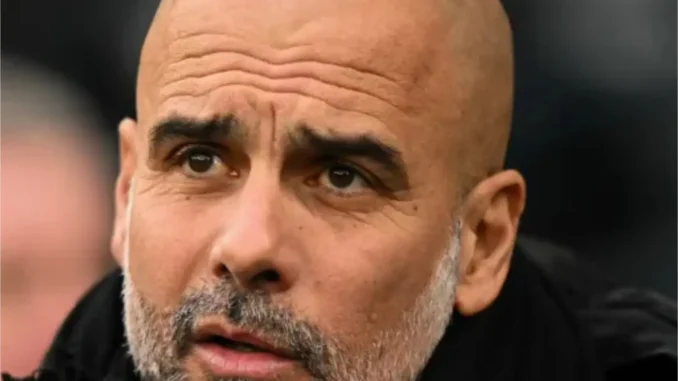
On a crisp Sunday afternoon in April 2025, the iconic Old Trafford stadium played host to a Manchester derby that promised fireworks but delivered a fizzle—a goalless draw between Manchester United and Manchester City that left both sides rueing missed opportunities. For Pep Guardiola, the master tactician steering City’s ship through a turbulent season, the stalemate was a bitter pill, a chance to climb into the Premier League’s top four slipping through his fingers. As the sun dipped below the horizon, casting long shadows over the pitch, Guardiola stood before the press, his salt-and-pepper beard framing a face etched with frustration, and reflected on a game where his team “couldn’t punish” their rivals despite holding the reins.
The match itself was a study in contrasts—City’s possession-heavy philosophy clashing with United’s disciplined, counterattacking grit under Ruben Amorim. From the opening whistle, it was clear this wouldn’t be a classic. City controlled the ball, their intricate passing patterns weaving a web around United’s compact 5-4-1 setup, but the final thread eluded them. “We had control but not in the right spots to hurt them,” Guardiola admitted, his voice tinged with the weariness of a man who’s seen his side falter too often this year. The first half offered glimpses—a curling pass from debutant Nico O’Reilly finding Omar Marmoush, only for Harry Maguire to deflect it away—but the breakthrough never came. United, meanwhile, leaned on their pace, with Alejandro Garnacho and Patrick Dorgu threatening on the break, though their efforts lacked the venom to sting Ederson.
Guardiola’s assessment was blunt: United’s defensive shape was a fortress. “We know all the time against a 5-4-1, it’s always difficult,” he said, nodding to years of facing deep-lying defenses. “They defend narrow here, and we weren’t good enough to punish them.” City’s chances were few but telling—Marmoush unleashed a dipping free-kick that forced André Onana into a sprawling save, and later a scything volley that the keeper beat away. Yet, for all their possession, City’s process faltered. “There’s a process when the ball is on one side, the players need to be in the right position,” Guardiola explained. “Today, that was not good enough.” It was a rare admission of imperfection from a manager whose teams have redefined precision over nine years in England.
Across the touchline, United’s tale was one of resilience but toothlessness. Garnacho danced past defenders, his pace a dagger City couldn’t dull, yet his stooping header missed the mark. Substitute Joshua Zirkzee nearly stole the show, his half-volley drawing a stunning two-handed save from Ederson, but the killer instinct eluded them too. Amorim’s side, languishing in 13th, held firm, their backline a wall that City couldn’t breach. For Guardiola, the point earned was a consolation, not a triumph. “I’d prefer to win, but we take the point,” he said, his pragmatism cutting through the disappointment. “Old Trafford is Old Trafford.”
This wasn’t the City of old, the relentless machine that’s claimed six Premier League titles under Guardiola. Injuries—to Erling Haaland, Rodri, and a trio of center-backs—have hobbled them, and Kevin De Bruyne’s looming departure at season’s end added a poignant note to his final derby at United’s fortress. The Belgian conjured moments—a corner that bounced to Marmoush, a flicker of his old magic—but couldn’t break the deadlock. Guardiola hailed him as a legend, saying, “He’s going to stay in the history of the Premier League, not only of Man City,” a tribute to a decade of brilliance now winding down.
For United, the draw was a moral victory, a clean sheet against a rival they’ve toppled twice this season already—once in the league at the Etihad, once in the Champions League under Amorim’s Sporting CP reign. But with 11 goalless outings in 31 league games, their attacking woes are glaring. City, stuck in fifth with 52 points, felt the sting of dropping two more in their chase for Champions League qualification, a goal that’s become their lifeline in a season gone awry.
Guardiola’s gaze now turns forward—eight games left, an FA Cup semifinal looming, and a resolve to shore up the cracks. “The last games, we were much better, back four better,” he noted, clinging to signs of recovery. Yet, as he trudged off the Old Trafford turf, the echoes of a muted derby lingered—a reminder that even giants can stumble, and that punishing United, this time, was a bridge too far.
Leave a Reply